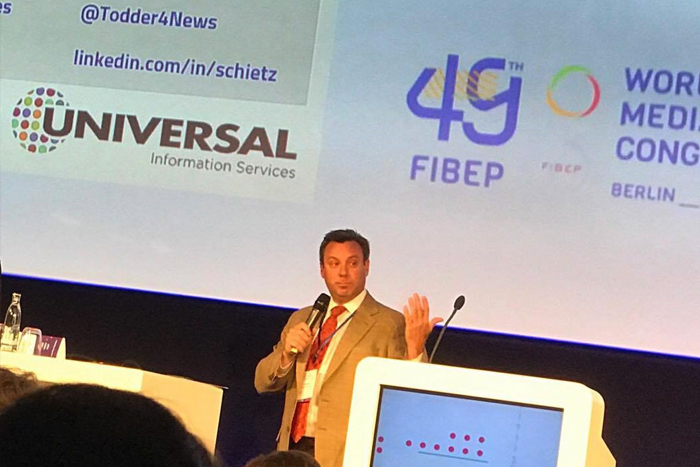Omaha-based Universal Information Services recently announced the release of the world’s first press clipping service enhanced with artificial intelligence. The unveiling came during the 49th World Media Intelligence Congress in Berlin, Germany.
The Alpha Clips news monitoring service focuses on the origins of news stories that are commonly shared online, delivering them in a format that is more quickly consumed.
Universal Information Services has been a provider of media monitoring services since 1908. The company first started monitoring the news by clipping newspaper articles for their clients with political interests so they could understand what was happening in their local communities.
Over the last 100 years, those services have expanded to cover all media types including, television, radio, websites and social media.
“The model has been to keep those informed who had a critical need to understand what was going on in the news media,” said Todd Murphy, Universal Information Services Vice President. “The problem that fragmenting media has created, is that our customers […] don’t have any additional time in the day to consume all the important news they need to see.”
That need is what led Universal Information Services to harness AI as a means of streamlining the consumption of news content for their clients, which now includes, corporations, nonprofit organizations, state and federal agencies, public relations firms and more.
Alpha Clips applies artificial intelligence to analyze and summarize newspaper, magazine and online coverage so found news can be read more quickly by the user. For example, the software knows the importance of a headline and that the first paragraph contains more key elements than subsequent paragraphs.
‘The AI understands the conventions of journalism and the structure of news stories,” said Murphy. “Then, we help train it to understand [which] subjects within those stories are most important to our clients.”
Alpha Clips also clusters related articles from across media outlets and provides links to them under the primary clipping.
Murphy said that the company may have started out in a very low-tech industry, but Universal Information Services’s ability to adapt to emerging technology and pivot their services is what has ensured their longevity.
“Our whole company culture is structured around not necessarily a startup mentality, but a restart mentality,” said Murphy. “We’re constantly restarting the way we look at how we provide services so we can continually innovate and provide better services.”
Murphy realizes that his company’s restart mentality isn’t always the norm for established companies, especially ones that are over 100 years-old.
“A lot of our peers have either fallen behind or simply gone out of business because they have not continued to innovate within our industry,” said Murphy. “If you’re having success now in a legacy industry, that is most likely not going to last. I feel that making innovation part of your culture is critical to the survival of any company at this point.”
Murphy joined Universal Information Services in 1991 and has been focused on keeping his team forward-thinking. Under his guidance, the company has developed a lot of firsts in the news monitoring space. In 1992, Universal Information Services became the first company to simultaneously monitor multiple news channels by pulling the closed captioned text out of the video stream.
For Alpha Clips, Universal Information Services spent a year developing and testing their AI. A lot goes into developing the company’s innovations, but Murphy isn’t concerned with keeping their intellectual property out of the hands of their competitors through litigation.
“The lifespan of an innovative technology is probably three to five years max. By the time somebody knocks off a process you created, you should already be working on your next innovation,” said Murphy. “Simply create products that your customers find amazing and then move on to the next innovation.”
But Murphy said he conscious not to get caught up in technology for technology’s sake.
“Just because we can do it, doesn’t mean we should do it,” said Murphy. “A problem I see with startup companies is that they have this kickass technology and then nobody cares.”
He said the lack of interest from clients is a result of there not being a sufficient marketable reason for the technology to exist.
“[It’s] a solution looking for a problem,” said Murphy. “Once I lose sight of my customers’ needs, then I don’t have a business model. That’s what I tell people who are starting a business; focus on your customers’ needs and that will lead you to success.”
Murphy relies on his team members to hold his ideas accountable.
“It’s not uncommon for them to say, ‘Todd, I’m not sure that idea is a good one.’ That’s what I ask of my team,” said Murphy. “They’re rewarded for their performance and innovation alongside me,”
Alpha Clips will be available to a few select clients beginning October 22nd with a complete nationwide rollout scheduled for November 1st.
––
Christine McGuigan is the Managing Editor of Silicon Prairie News





